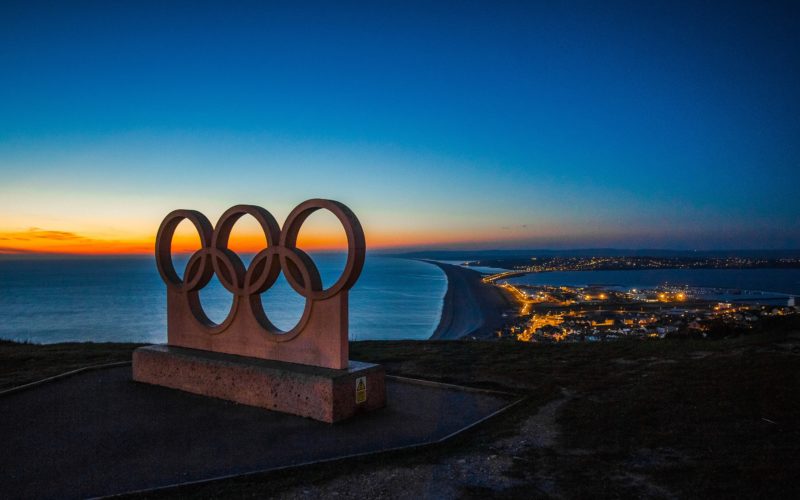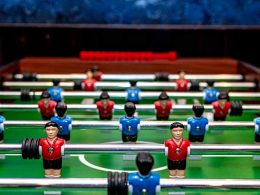On December 17, 2020, the Court of Arbitration for Sport (“CAS”), issued a landmark decision reducing the sanctions imposed on Russia for its years-long, state-sponsored athlete doping scheme.1[1]Associated Press, CAS blasts Russia’s ‘cover up of the cover-up,’ defends reduced sanctions in report, ESPN (Jan. 13, 2021), https://www.espn.com/olympics/story/_/id/30708500/cas-blasts-russia-cover-cover-defends-reduced-sanctions-report; See also, World-Anti Doping Agency v. Russian Anti-Doping Agency, CAS 2020/O/6689, Arbitral Award (2020) (Switz.) The World-Anti Doping Agency (“WADA”) initially banned Russia from competing in the Olympics and other major world events for four years.2[2]Id. Following an appeal by the Russian Anti-Doping Agency (“RUSADA”), CAS reduced the ban to two years.3[3]Id. Additionally, the panel upheld previous findings that the RUSADA was non-compliant with the World Anti-Doping Agency Code (“the Code”).4[4]Andy Brown, CAS Decision outlines RUSADA’s control by the Russian State, The Sports Integrity Initiative (Jan. 19, 2021), https://www.sportsintegrityinitiative.com/cas-decision-outlines-rusada-control-by-the-russian-state/#:~:text=In%20order%20to%20effectively%20challenge,accepted%20that%20manipulations%20had%20occurred.
The initial sanctions, imposed by WADA in December 2019, were in response to a Russian doping scheme that unraveled after the 2014 Sochi Olympic Games. Both WADA and independent antidoping investigators also caught Russia attempting to cover-up the scheme: Russian officials fabricated evidence, deleted data, and backdated its computer systems.5[5]Michael Pavitt, WADA claims CAS panel failed to fully explain why Russia sanctions were reduced, inside the games (Jan. 14, 2021), https://www.insidethegames.biz/articles/1102995/cas-award-russia-wada-case-outlined The Russian doping scandal and subsequent disciplinary proceedings have proven highly controversial and corrosive to sport. This article will analyze the scandal’s history, the reasoning underlying the CAS decision, and the implications for the future of international sport.
The Russian Doping Scheme and WADA’s Response
The Russian doping scheme first became widely known in November 2015, with the release of the Germany documentary Top Secret Doping: How Russia Makes its Winners. Through an independent commission, WADA investigated the allegations and found a “deeply rooted culture of cheating” in Russian sports.6[6]Kayleena Makortoff, What you need to know about Russia’s doping scandal, CNBC (Nov. 12, 2015, 7:36 AM), https://www.cnbc.com/2015/11/12/what-you-need-to-know-about-russias-doping-scandal.html The investigation exposed widespread corruption by state officials, RUSADA, the Russian Ministry of Sport, and all of Russia’s Athletic Federations, who conspired in covering up professional athletes’ doping.7[7]Id. Additionally, the report found that Moscow lab officials intentionally destroyed over 1,400 lab samples after WADA asked for them.8[8]Id.
Although doping agencies around the world pressed the IOC to ban all Russian athletes from the 2016 Rio Summer Olympic Games, the IOC rejected a blanket ban and left it to each sport’s international federation to determine individual athlete eligibility under strict standards.9[9]Dan Roan, Rio Olympics 2016: Russia not given blanket Games ban by IOC, BBC (Jul. 24, 2016), https://www.bbc.com/sport/olympics/36878983.amp Both the International Association of Athletics Federations (“IAAF”), track and field’s global governing body (now known as World Athletics), and the International Weightlifting Federation imposed complete bans on Russian athletes. Seven other international federations imposed partial bans, and all other international federations did not sanction at all.10[10]See, Decision of the IOC Executive Board Concerning the Participation of Russian Athletes in the Olympic Games Rio 2016, INT’L OLYMPIC COMMITTEE (Jul. 24, 2016), https://www.olympic.org/news/decision-of-the-ioc-executive-board-concerning-the-participation-of-russian-athletes-in-the-olympic-games-rio-2016
In July 2016, WADA commissioned a second independent investigation, which issued reports in July and December 2016 confirming that the WADA-accredited lab in Moscow was operating to protect doped Russian athletes. Approximately 1,000 Russian athletes in 30 sports benefited from the state-sponsored doping program for several years.11[11]Sean Ingle, Russian state doped more than 1,000 athletes and corrupted London 2012, The Guardian (Dec. 9, 2016, 6:30 PM), https://www.theguardian.com/sport/2016/dec/09/more-than-1000-russian-athletes-benefitted-from-state-sponsored-doping The IOC organized two commissions to further investigate and, in December 2017, voted to suspend the Russian Olympic Committee (“ROC”) and ban Russia from the 2018 PyeongChang Winter Olympic Games.12[12]IOC Suspends Russian NOC and Creates A Path for Clean Individual Athletes to Compete in PyeongChang 2018 Under the Olympic Flag, INT’L OLYMPICS COMMITTEE (Dec. 5, 2017), https://www.olympic.org/news/ioc-suspends-russian-noc-and-creates-a-path-for-clean-individual-athletes-to-compete-in-pyeongchang-2018-under-the-olympic-flag Russian athletes not previously accused of doping and who survived strict scrutiny were allowed to compete as individuals denominated “Olympic Athletes from Russia.”13[13]Rachel Axon, Russia banned from Olympics, athletes can compete as ‘neutral’, wykc (Dec. 5, 2017, 4:23 PM), https://www.wkyc.com/article/sports/olympics/ioc-suspends-russian-olympic-committee/507-497000621 Additionally, the IOC banned Russia’s Deputy Prime Minister of Sport Vitaly Mutko from the Olympics for life, stripped athletes of medals, and imposed a $15 million fine to pay for the doping investigations.14[14]Id. This was the first time IOC has suspended an entire nation, from the Olympics, for doping.15[15]Id.
After the 2018 Olympic Games, the Code and the International Standard for Code Compliance by Signatories (“ISCCS”) were amended to grant WADA authority, for the first time, to impose sanctions.16[16]WADA Executive Committee unanimously endorses four-year period of non-compliance for the Russian Anti-Doping Agency, WORLD ANTI-DOPING AGENCY (Dec. 9, 2019) https://www.wada-ama.org/en/media/news/2019-12/wada-executive-committee-unanimously-endorses-four-year-period-of-non-compliance [hereinafter WADA Decision]; WADA CODE, Art. 12.1 (Jan. 1, 2015), https://www.wada-ama.org/sites/default/files/resources/files/wada_anti-doping_code_2018_english_final.pdf In September 2018, WADA’s executive committee voted to reinstate RUSADA and Russia under the condition that they turn over unadulterated data from the Moscow laboratory.17[17]Id. RUSADA and Russia failed to fulfill this requirement, which WADA considered an act of critical non-compliance under the Code.18[18]Id. Significant evidence established that Russia attempted to “cover-up the cover-up,”19[19]Russia’s Olympic ban upheld but reduced to two years from four by Court of Arbitration for Sport, Sky Sports (Dec. 19, 2020, 5:08 PM), https://www.skysports.com/olympics/news/15234/12165525/russias-olympic-ban-upheld-but-reduced-to-two-years-from-four-by-court-of-arbitration-for-sport including by manipulating test results, backdating computer files, and falsifying messages to incriminate former Russia lab director and whistleblower, Dr. Grigory Rodchenkov.20[20]WADA Legal Note on the CAS Award in WADA v. RUSADA (CAS 2020/O/6689), world anti-doping agency, 1 (Jan. 14, 2021), https://www.wada-ama.org/sites/default/files/resources/files/2020-01-13_note_on_cas_award_en.pdf [hereinafter Legal Note]
In December 2019, WADA banned Russia from international competition for four years, excluding it from the 2021 (rescheduled) Tokyo Winter Games and the 2022 Beijing Summer Games. WADA also ruled that Russian athletes may compete as neutrals only if not implicated in any way in the various state doping schemes and ensuing cover up.21[21]Id. During the four-year ban, Russian government officials and representatives may not sit on any sport’s governing committees or bodies, and may not attend any Olympics or major sporting event. Russia may not host or bid to host any sporting event, and RUSADA must pay all of WADA’s investigations costs. WADA’s sanctions were of the most severe in global sport history.22[22]Id.
Russia and RUSADA appealed WADA’s sanctions to CAS, arguing that no one deliberately manipulated the Moscow lab data, and even if data were manipulated, third parties outside their control were responsible.23[23]Legal Note, supra note 27, at 2 para 10. RUSADA also argued that WADA’s sanctions breached fundamental principles of human rights by presuming the guilt of affected athletes and imposing collective illegal punishment.24[24]Id. at 4, para 17. Additionally, Russia and RUSADA argued that the WADA sanctions infringed the principle of proportionality, exceeding what was necessary to achieve the legitimate purpose of fighting doping.25[25]Id.
The CAS Decision
In December 2020, after a four-day arbitration procedure involving 50 intervening parties, CAS rendered its landmark decision reducing WADA’s four-year ban to two years.26[26]World-Anti Doping Agency v. Russian Anti-Doping Agency, CAS 2020/O/6689, Arbitral Award (2020) (Switz.) The panel upheld WADA’s findings that RUSADA was non-compliant with the Code and subject to strict liability for any data manipulation.27[27]Legal Note, supra note 27, at 6. Additionally, CAS affirmed that for RUSADA to be reinstated it must pay $1.27 million and in good faith do everything possible to locate authentic data from the Moscow laboratory.28[28]Id. at 9, para 32. However, CAS decided to reinstate Russia as of December 16, 2022, rather than until just before the Paris 2024 Olympic Games.29[29]PAVITT, supra note 5.
The CAS decision hinged on its assessment of proportionality, finding that WADA’s objectives could be adequately achieved with lesser consequences: “this panel has imposed consequences to reflect the nature and seriousness of the noncompliance…and to ensure that the integrity of sport against the scourge of doping is maintained.”30[30]WADA v. RUSADA, CAS 2020/O/6689, Arbitral Award, 179, para 860. (2020) (Switz.) Although the CAS panel agreed with WADA as to the seriousness of the offense and condemned the cover-up, it reasoned that deterrence can be achieved without punishing a new generation of Russian athletes.31[31]PAVITT, supra note 5. Additionally, CAS noted that its two-year ban achieved WADA’s intention of including one summer and one winter Olympic Games. CAS explained the reduction as designed in part to mitigate pandemic-related disruption in preparing for future Olympics.32[32]Id.
The CAS decision also weakened other aspects of WADA’s sanctions. First, CAS eliminated certain criteria for Russian athletes to prove they are clean, banning only those athletes who are currently serving a doping suspension. CAS justified this lesser standard as necessary to avoid “lengthy investigations and subsequent litigation as to whether an athlete has been able to discharge the burden.”33[33]Id. CAS further stated, “it was not persuaded that an exclusion placing the onus on athletes to prove they were not implicated by RUSADA’s non-compliance would be appropriate.”34[34]Id. Thus, CAS effectively shifted the burden from the athletes to prove their eligibility onto WADA to prove their ineligibility. Second, while CAS upheld the requirement that eligible Russian athletes compete as neutrals, without using their national anthem or flag, it allows the athletes’ uniforms to display the word “Russia,” and allows Russian officials to attend major sporting events if invited by the host nation.35[35]BROWN, supra note 4. CAS reasoned that this approach maintains the objective of not recognizing Russia as an institution while limiting the effects the sanctions have on clean athletes.36[36]Id. Although, RUSADA can appeal this decision to the Federal Supreme Court of Switzerland, it has decided not to do so.37[37]Michael Pavitt, RUSADA confirms it will not appeal against two-year sanction imposed by CAS, inside the games, (Jan. 25, 2021), https://www.insidethegames.biz/articles/1103422/rusada-will-not-appeal-cas-decision WADA also did not appeal the CAS decision, believing an appeal would serve no useful purpose.38[38]WADA does not appeal CAS decision regarding Russian Anti-Doping Agency to Swiss Federal Tribunal, world anti-doping agency, (Feb. 2, 2021), https://www.wada-ama.org/en/media/news/2021-02/wada-does-not-appeal-cas-decision-regarding-russian-anti-doping-agency-to-swiss
Many believe the CAS decision has undermined confidence in anti-doping principles and processes. By the time CAS heard this case, multiple investigations revealed the severity of the doping scandal. While CAS correctly affirmed the findings of a Russian cover-up, its analysis of proportionality placed inappropriate emphasis on the effects of the ban on clean athletes. The principle of proportionality requires that the sanction not exceed what is reasonably necessary to achieve a legitimate objective and imposes constraints on affected parties that are justified in overall interest of attaining the envisioned goal.39[39]IAAF v. ARAF, Yuliya Zaripova & RUSADA, CAS 2015/A/4006, Award (Apr. 25, 2016) (Switz.) Here, the goal is to preserve the integrity of clean sport in general, and also in Russia in particular.40[40]WADA v. RUSADA, CAS 2020/O/6689, Arbitral Award, 149, para. 711 (2020) (Switz). Given how Russia has obstructed the entire process, it should not be rewarded with a reduction of sanctions. WADA gave Russia an opportunity to be reinstated and it deliberately chose deceit and fraud over compliance. While it is unfair to punish hardworking athletes who have not cheated, the CAS decision largely defeats whatever deterrent value the sanction might have had on Russia. Previous PyeongChang sanctions clearly did not deter Russia as it continued to tamper with evidence. Ironically, while proportionality was key to CAS’s reasoning, the panel did not provide any explanation why two years is a suitably proportionate sanction.41[41]BROWN, supra note 4.
Furthermore, CAS’s concern for the Russian athletes is misplaced since the majority will still be eligible to compete under the modified WADA sanctions. By shifting the burden from Russian athletes to prove their innocence to WADA having to prove their guilt, many athletes who previously engaged in doping are likely to compete. As the panel recognized, due to Russia’s mass manipulation and tampering of evidence, “it will never be possible to know the number of cheating athletes or officials who may have escaped detection.”42[42]WADA v. RUSADA, CAS 2020/O/6689, Arbitral Award, 148, para. 703 (2020) (Switz). Therefore, CAS’s justification for not wanting to punish clean athletes is unsound when there is no competent system in place to prove who is clean.
Throughout the scandal, both the IOC and WADA faced heavy criticism that their mishandling of the situation contributed to Russia’s corruption and fraud.43[43]Andrew Keh and Tariq Panja, ‘It Doesn’t work’: Critics of Russia’s Doping Ban Blame the System, New York Times (Dec. 21, 2020), https://www.nytimes.com/2020/12/21/sports/olympics/russia-doping-wada-cas.html In response, WADA instituted new leadership and stricter protocols. The CAS decision undermines those reform efforts and diminishes stakeholder confidence in global sports’ ability to effectively regulate doping. Travis Tygart, chief executive of the United States Anti-Doping Agency, labeled the CAS decision a “catastrophic blow to clean athletes, the integrity of sport, and the rule of law.”44[44]Rick Maese, Russia remains barred from Tokyo Olympics after court reduces doping ban to two years, WASHINGTON POST (Dec. 17, 2020, 11:18 AM), https://www.washingtonpost.com/sports/2020/12/17/russian-doping-ban-appeal/ The United States Olympic and Paralympic Committee stated, “what is clear at this point is the blatant disregard shown for the rules and purpose of anti-doping regulation in this case has harmed clean athletes and gone further to erode confidence in the international anti-doping construct.”45[45]Laurel Wamsley and Merrit Kennedy, Russia Gets Its Doping Ban Reduced But Will Miss Next 2 Olympics, NPR (Dec. 17, 2020), https://www.npr.org/2020/12/17/947504052/russia-suspended-from-next-2-olympic-games-over-anti-doping-violations
The disappointment that is the overwhelming reaction to CAS’s decision confirms that CAS failed to adequately justify or explain its proportionality rationale. The attorney for whistleblower Rodchenkov, Jim Walden, reacted: “the decision by CAS to effectively ‘split the baby’ is nonsensical and undeserved. Despite overwhelming proof of corruption, doping fraud and obstruction of justice, including a brazen attempt to falsely incriminate Dr. Rodchenkov through fabricated evidence, CAS has once again proven itself unwilling and unable to meaningfully deal with systematic and longstanding criminality by Russia.”46[46]MAESE, supra note 64.
Many Olympic athletes also expressed tremendous disappointment with CAS’s decision, and with shared feelings of hopelessness and discouragement for the future of clean sport.47[47]KEH and PANJA, supra note 63. Olympian biathlete Clare Egan said she “found it absurd that the court claimed that its sanctions would ‘encourage the next generation of Russian athletes to participate in clean international sport.’ ‘How does not punishing the previous generation of dopers encourage the next generation to be clean?’”48[48]Id. Further weakening the sanctions is that CAS is allowing athletes to affiliate with Russia on uniforms and allowing Russian officials to attend events.49[49]Id.
While CAS announced that meaningful consequences were necessary to ensure confidence in “clean athletes, stakeholders and the wider public in the ability of WADA to defend the integrity of sport against doping,” its decision fails tremendously in that goal.50[50]WADA v. RUSADA, CAS 2020/O/6689, Arbitral Award, 149, para. 711, (2020) (Switz). Its weak reasoning errs principally in prioritizing the effect on future generations of Russian athletes over the effect on athletes all over the world and global sport generally.51[51]BROWN, supra note 4. Max Cobb, President of the U.S. Biathlon Association said, “the decision set a dangerous precedent that essentially invited other countries to engage in similar schemes, and further eroded confidence among athletes worldwide that their sports would ever be clean.”52[52]KEH and PANJIA, supra note 63.
Written by: Lanie Halpern
Lanie is a 2022 J.D. Candidate at Brooklyn Law School
1 Associated Press, CAS blasts Russia’s ‘cover up of the cover-up,’ defends reduced sanctions in report, ESPN (Jan. 13, 2021), https://www.espn.com/olympics/story/_/id/30708500/cas-blasts-russia-cover-cover-defends-reduced-sanctions-report; See also, World-Anti Doping Agency v. Russian Anti-Doping Agency, CAS 2020/O/6689, Arbitral Award (2020) (Switz.)
2 Id.
3 Id.
4 Andy Brown, CAS Decision outlines RUSADA’s control by the Russian State, The Sports Integrity Initiative (Jan. 19, 2021), https://www.sportsintegrityinitiative.com/cas-decision-outlines-rusada-control-by-the-russian-state/#:~:text=In%20order%20to%20effectively%20challenge,accepted%20that%20manipulations%20had%20occurred.
5 Michael Pavitt, WADA claims CAS panel failed to fully explain why Russia sanctions were reduced, inside the games (Jan. 14, 2021), https://www.insidethegames.biz/articles/1102995/cas-award-russia-wada-case-outlined
6 Kayleena Makortoff, What you need to know about Russia’s doping scandal, CNBC (Nov. 12, 2015, 7:36 AM), https://www.cnbc.com/2015/11/12/what-you-need-to-know-about-russias-doping-scandal.html
7 Id.
8 Id.
9 Dan Roan, Rio Olympics 2016: Russia not given blanket Games ban by IOC, BBC (Jul. 24, 2016), https://www.bbc.com/sport/olympics/36878983.amp
10 See, Decision of the IOC Executive Board Concerning the Participation of Russian Athletes in the Olympic Games Rio 2016, INT’L OLYMPIC COMMITTEE (Jul. 24, 2016), https://www.olympic.org/news/decision-of-the-ioc-executive-board-concerning-the-participation-of-russian-athletes-in-the-olympic-games-rio-2016
11 Sean Ingle, Russian state doped more than 1,000 athletes and corrupted London 2012, The Guardian (Dec. 9, 2016, 6:30 PM), https://www.theguardian.com/sport/2016/dec/09/more-than-1000-russian-athletes-benefitted-from-state-sponsored-doping
12 IOC Suspends Russian NOC and Creates A Path for Clean Individual Athletes to Compete in PyeongChang 2018 Under the Olympic Flag, INT’L OLYMPICS COMMITTEE (Dec. 5, 2017), https://www.olympic.org/news/ioc-suspends-russian-noc-and-creates-a-path-for-clean-individual-athletes-to-compete-in-pyeongchang-2018-under-the-olympic-flag
13 Rachel Axon, Russia banned from Olympics, athletes can compete as ‘neutral’, wykc (Dec. 5, 2017, 4:23 PM), https://www.wkyc.com/article/sports/olympics/ioc-suspends-russian-olympic-committee/507-497000621
14 Id.
15 Id.
16 WADA Executive Committee unanimously endorses four-year period of non-compliance for the Russian Anti-Doping Agency, WORLD ANTI-DOPING AGENCY (Dec. 9, 2019) https://www.wada-ama.org/en/media/news/2019-12/wada-executive-committee-unanimously-endorses-four-year-period-of-non-compliance [hereinafter WADA Decision]; WADA CODE, Art. 12.1 (Jan. 1, 2015), https://www.wada-ama.org/sites/default/files/resources/files/wada_anti-doping_code_2018_english_final.pdf
17 Id.
18 Id.
19 Russia’s Olympic ban upheld but reduced to two years from four by Court of Arbitration for Sport, Sky Sports (Dec. 19, 2020, 5:08 PM), https://www.skysports.com/olympics/news/15234/12165525/russias-olympic-ban-upheld-but-reduced-to-two-years-from-four-by-court-of-arbitration-for-sport
20 WADA Legal Note on the CAS Award in WADA v. RUSADA (CAS 2020/O/6689), world anti-doping agency, 1 (Jan. 14, 2021), https://www.wada-ama.org/sites/default/files/resources/files/2020-01-13_note_on_cas_award_en.pdf [hereinafter Legal Note]
21 Id.
22 Id.
23 Legal Note, supra note 27, at 2 para 10.
24 Id. at 4, para 17.
25 Id.
26 World-Anti Doping Agency v. Russian Anti-Doping Agency, CAS 2020/O/6689, ArbitralAward (2020) (Switz.)
27 Legal Note, supra note 27, at 6.
28 Id. at 9, para 32.
29 PAVITT, supra note 5.
30 WADA v. RUSADA, CAS 2020/O/6689, Arbitral Award, 179, para 860. (2020) (Switz.)
31 PAVITT, supra note 5.
32 Id.
33 Id.
34 Id.
35 BROWN, supra note 4.
36 Id.
37 Michael Pavitt, RUSADA confirms it will not appeal against two-year sanction imposed by CAS, inside the games, (Jan. 25, 2021), https://www.insidethegames.biz/articles/1103422/rusada-will-not-appeal-cas-decision
38 WADA does not appeal CAS decision regarding Russian Anti-Doping Agency to Swiss Federal Tribunal, world anti-doping agency, (Feb. 2, 2021), https://www.wada-ama.org/en/media/news/2021-02/wada-does-not-appeal-cas-decision-regarding-russian-anti-doping-agency-to-swiss
39 IAAF v. ARAF, Yuliya Zaripova & RUSADA, CAS 2015/A/4006, Award (Apr. 25, 2016) (Switz.)
40 WADA v. RUSADA, CAS 2020/O/6689, Arbitral Award, 149, para. 711 (2020) (Switz).
41 BROWN, supra note 4.
42 WADA v. RUSADA, CAS 2020/O/6689, Arbitral Award, 148, para. 703 (2020) (Switz).
43 Andrew Keh and Tariq Panja, ‘It Doesn’t work’: Critics of Russia’s Doping Ban Blame the System, New York Times (Dec. 21, 2020), https://www.nytimes.com/2020/12/21/sports/olympics/russia-doping-wada-cas.html
44 Rick Maese, Russia remains barred from Tokyo Olympics after court reduces doping ban to two years, WASHINGTON POST (Dec. 17, 2020, 11:18 AM), https://www.washingtonpost.com/sports/2020/12/17/russian-doping-ban-appeal/
45 Laurel Wamsley and Merrit Kennedy, Russia Gets Its Doping Ban Reduced But Will Miss Next 2 Olympics, NPR (Dec. 17, 2020), https://www.npr.org/2020/12/17/947504052/russia-suspended-from-next-2-olympic-games-over-anti-doping-violations
46 MAESE, supra note 64.
47 KEH and PANJA, supra note 63.
48 Id.
49 Id.
50 WADA v. RUSADA, CAS 2020/O/6689, Arbitral Award, 149, para. 711, (2020) (Switz).
51 BROWN, supra note 4.
52 KEH and PANJIA, supra note 63.




